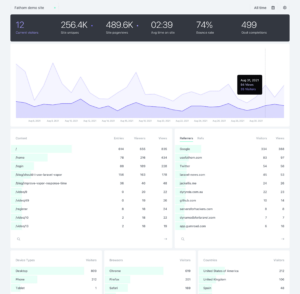Google Analytics is a web analytics service that tracks and reports website performance. It is the most widely used source of performance data used by organisations across the world. At ECC we’ve used it for many years to understand what is working, identify pain points and evolve our websites for the better.
Like most government organisations, at ECC we have a large web estate made up of around 60 websites. These span a wide range of services, campaigns, and information. When joining ECC back in December 2020 I found that GA was present on almost all the sites, providing teams with a wealth of valuable performance data.
I began reaching out to site owners to understand their experience with GA and quickly found that very few accounts were being used to their full potential. It seemed GA had been added to most websites during the launch phase, but limited work had been done to tailor and develop the tracking over time.
The data could help sites owners understand audience behaviour, identify pain points, and ultimately develop an ongoing programme of improvement for their websites. However, service teams lacked the time, confidence, and support to really understand the detailed data available to them.
Despite being the industry standard tool, Google Analytics has always been complex to use, and it seemed that teams were struggling to access and make sense of the data that really mattered to them.
This challenge was significant, especially as we had begun work to shift to an ‘opt in’ approach to website tracking across the ECC web estate. In line with our user centred approach to development, as well as updated guidance from the Information Commissioners Office (ICO), we had made a commitment to ask users for their consent before using tracking tools like GA that use cookies during the data collection process.
This commitment presented both a huge resourcing challenge - each website would require development work to prevent the dropping of tracking cookies prior to consent - as well as challenges in terms of the reliability of the data.
If we were only able to track users that consented to our use of cookies, we'd only see a certain proportion of the usage data. In some instances, organisations were reporting up to an 80% decrease in their website data.
After a thorough exploration phase, we reached the conclusion that GA wasn’t the most appropriate tracking solution for all ECC websites. It would take a huge amount of time and resource to ensure cookie compliance across the entire web estate and even then, not every team would have the resources to use the insights to their full potential.
Researching alternatives
With this in mind, we started to research other analytics platforms. We found Fathom Analytics, a simple yet powerful analytics tool that presented data via a single-page dashboard. Most importantly it was privacy focused and didn't use cookies in the data collection process.
Whilst Fathom wouldn't provide us with the in-depth insights required for high volume, constantly evolving sites such as Essex.gov.uk, it would likely provide us with the data we needed for smaller microsites with fewer users and fewer content/development updates.
The intuitive interface and helpful online resources also meant site owners and stakeholders would have access to something they could understand and make use of straight away without the need for in-depth training and guidance.
Fast forward to December 2022 and we now have Fathom Analytics up and running on over 25 of our microsites.

Here’s what we’ve learnt so far:
- Implementation of the tool is quick and straightforward
- The dashboard is generally very quick to load due to the streamlined nature of the data available
- The team at Fathom are responsive to questions and open about the changes they’re making to the product – all recent updates are published via their change log
- The team invite feature requests via an online form so customers can directly feed into the development roadmap
- ECC stakeholders find the dashboard easy to understand and feel empowered to make changes based on the insights
- Colleagues particularly like the way they’re able to access a performance overview quickly and easily without navigating through multiple pages of GA reports.
It's still relatively early days so we'll be monitoring the questions and feedback from site owners to decide whether Fathom is the best long-term solution; however, early signs are certainly promising.
Next steps
Having a found a solution that works for around a third of our websites, our focus has now shifted to the tracking options available for high priority websites that are used by hundreds of thousands of residents each month.
For these sites we need greater flexibility and customisation options to drive ongoing content and development iterations in line with user needs.
Over the coming months we'll be:
- piloting Matomo Analytics (another cookie-less tracking option) on one of our websites to understand exactly what data it can provide
- following the development of Google Analytics 4 (the latest version of GA) closely and trialling it via our demo sites for Essex.gov.uk and Intranet.essex.gov.uk – both due to be migrated in early 2023
- working with Information Governance colleagues to ensure all tools are implemented in a way that’s fully compliant and privacy first
There’s a way to go but we’re committed to adopting a requirements-based approach to the tracking tools we use as opposed to relying on GA in every instance.
This will ensure service teams have the capacity to monitor and act on the data available to them, and that all updates to our online services are made based on clear user insight
Leave a comment